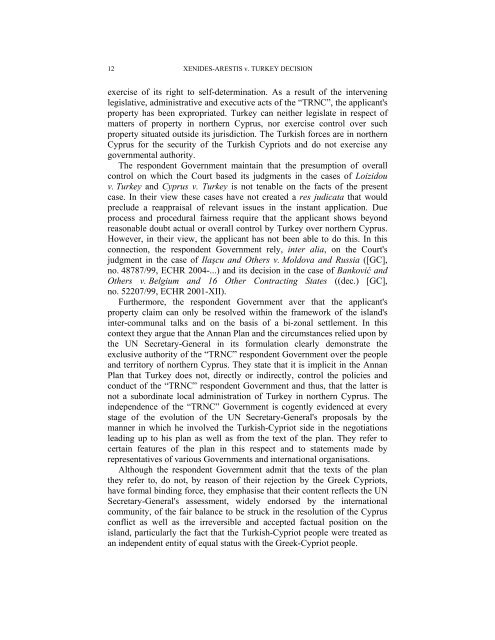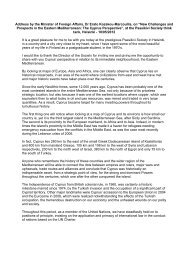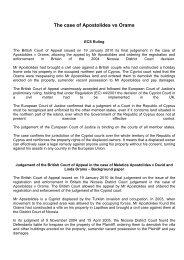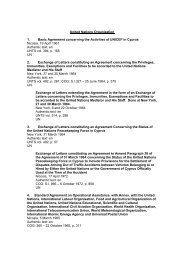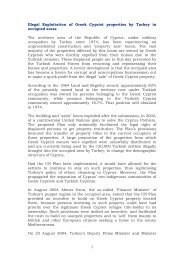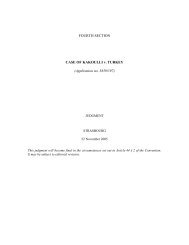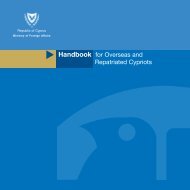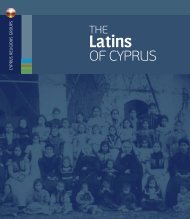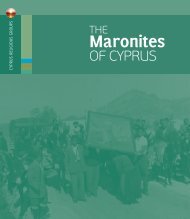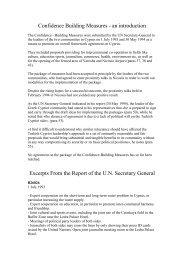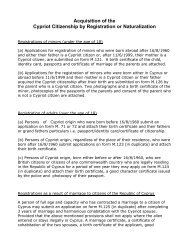Myra Xenides- Arestis v. Turkey
Myra Xenides- Arestis v. Turkey
Myra Xenides- Arestis v. Turkey
Create successful ePaper yourself
Turn your PDF publications into a flip-book with our unique Google optimized e-Paper software.
12 XENIDES-ARESTIS v. TURKEY DECISIONexercise of its right to self-determination. As a result of the interveninglegislative, administrative and executive acts of the “TRNC”, the applicant'sproperty has been expropriated. <strong>Turkey</strong> can neither legislate in respect ofmatters of property in northern Cyprus, nor exercise control over suchproperty situated outside its jurisdiction. The Turkish forces are in northernCyprus for the security of the Turkish Cypriots and do not exercise anygovernmental authority.The respondent Government maintain that the presumption of overallcontrol on which the Court based its judgments in the cases of Loizidouv. <strong>Turkey</strong> and Cyprus v. <strong>Turkey</strong> is not tenable on the facts of the presentcase. In their view these cases have not created a res judicata that wouldpreclude a reappraisal of relevant issues in the instant application. Dueprocess and procedural fairness require that the applicant shows beyondreasonable doubt actual or overall control by <strong>Turkey</strong> over northern Cyprus.However, in their view, the applicant has not been able to do this. In thisconnection, the respondent Government rely, inter alia, on the Court'sjudgment in the case of Ilaşcu and Others v. Moldova and Russia ([GC],no. 48787/99, ECHR 2004-...) and its decision in the case of Banković andOthers v. Belgium and 16 Other Contracting States ((dec.) [GC],no. 52207/99, ECHR 2001-XII).Furthermore, the respondent Government aver that the applicant'sproperty claim can only be resolved within the framework of the island'sinter-communal talks and on the basis of a bi-zonal settlement. In thiscontext they argue that the Annan Plan and the circumstances relied upon bythe UN Secretary-General in its formulation clearly demonstrate theexclusive authority of the “TRNC” respondent Government over the peopleand territory of northern Cyprus. They state that it is implicit in the AnnanPlan that <strong>Turkey</strong> does not, directly or indirectly, control the policies andconduct of the “TRNC” respondent Government and thus, that the latter isnot a subordinate local administration of <strong>Turkey</strong> in northern Cyprus. Theindependence of the “TRNC” Government is cogently evidenced at everystage of the evolution of the UN Secretary-General's proposals by themanner in which he involved the Turkish-Cypriot side in the negotiationsleading up to his plan as well as from the text of the plan. They refer tocertain features of the plan in this respect and to statements made byrepresentatives of various Governments and international organisations.Although the respondent Government admit that the texts of the planthey refer to, do not, by reason of their rejection by the Greek Cypriots,have formal binding force, they emphasise that their content reflects the UNSecretary-General's assessment, widely endorsed by the internationalcommunity, of the fair balance to be struck in the resolution of the Cyprusconflict as well as the irreversible and accepted factual position on theisland, particularly the fact that the Turkish-Cypriot people were treated asan independent entity of equal status with the Greek-Cypriot people.


